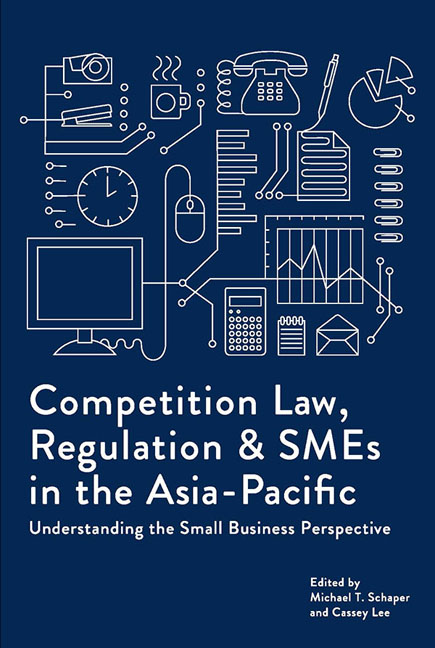 Competition Law, Regulation and SMEs in the Asia-Pacific
Competition Law, Regulation and SMEs in the Asia-Pacific Book contents
- Frontmatter
- Contents
- Foreword
- About the Contributors
- 1 Introduction: Making the Invisible SME More Visible in Competition Policy and Law
- Section 1 Theories And Basic Concepts
- Section 2 Smes And Competition Law
- 7 The Application of Per Ses to Smes: The Type 1 Error No One Notices?
- 8 Enforcing Competition Law Against SMEs: Presumptions and Problems
- 9 How Competition Law May Affect Franchised Smes in Apec Economies
- 10 Chinese Family Firms in Southeast Asia: Special Problems for Competition Law?
- 11 Trade Associations: Competition Law Advocates or Offenders?
- Section 3 Country Studies
- Index
9 - How Competition Law May Affect Franchised Smes in Apec Economies
from Section 2 - Smes And Competition Law
Published online by Cambridge University Press: 05 August 2017
- Frontmatter
- Contents
- Foreword
- About the Contributors
- 1 Introduction: Making the Invisible SME More Visible in Competition Policy and Law
- Section 1 Theories And Basic Concepts
- Section 2 Smes And Competition Law
- 7 The Application of Per Ses to Smes: The Type 1 Error No One Notices?
- 8 Enforcing Competition Law Against SMEs: Presumptions and Problems
- 9 How Competition Law May Affect Franchised Smes in Apec Economies
- 10 Chinese Family Firms in Southeast Asia: Special Problems for Competition Law?
- 11 Trade Associations: Competition Law Advocates or Offenders?
- Section 3 Country Studies
- Index
Summary
The business format franchise model has been widely adopted in many nations throughout the Asia-Pacific region because it provides an opportunity for individuals to establish their own small to medium-sized business as a franchisee. It also enables thriving businesses to expand quickly, and without compromising quality, into foreign and domestic jurisdictions as franchisors. Competition law, however, often impacts on franchise operations. The effects arise both from the general impact of competition law on business but also because of the vertical and horizontal structures associated with the franchisor/franchisee relationship. This chapter identifies the relevant competition laws throughout the Asia-Pacific Economic Cooperation (APEC) economies and provides examples of the competition law breaches that franchise networks must avoid. In particular, it examines the difficulties of market definition associated with franchise models and the challenges faced by competition regulators in communicating policy to franchisees and small and medium-sized enterprises (SMEs).
Introduction
Numerous small and medium-sized enterprises (SMEs) throughout the twenty-one Asia-Pacific Economic Cooperation (APEC) economies are operated as business format franchises. Two forms of franchising are widely recognized. In product franchising, a franchisor supplies branded products or services to a franchisee (seller), but does not control all aspects of how the franchisee conducts the retail business. The other form, business format franchising, is more allencompassing. It involves a franchisor creating a retail business, testing it, and resolving any problems, then documenting every aspect of the business and, finally, advertising for franchisees to purchase and operate franchised clones. The franchisor sells its franchisees a licence, typically for a fixed term. Franchisees then invest their own time and finances in establishing legally independent, but functionally dependent businesses, under the franchisor's brand while following the rules set out by the franchisor. The focus of this chapter is on business format franchising.
This model of franchising is increasingly popular, and has become ever more versatile and sophisticated since the mid-twentieth century. Franchising currently exists along a spectrum, from being a widely studied, highly regulated, and pervasive business model in countries such as Australia and the United States, to an unregulated, data-poor, fledgling activity in countries such as Papua New Guinea.
- Type
- Chapter
- Information
- Competition Law, Regulation and SMEs in the Asia-PacificUnderstanding the Small Business Perspective, pp. 156 - 174Publisher: ISEAS–Yusof Ishak InstitutePrint publication year: 2016


